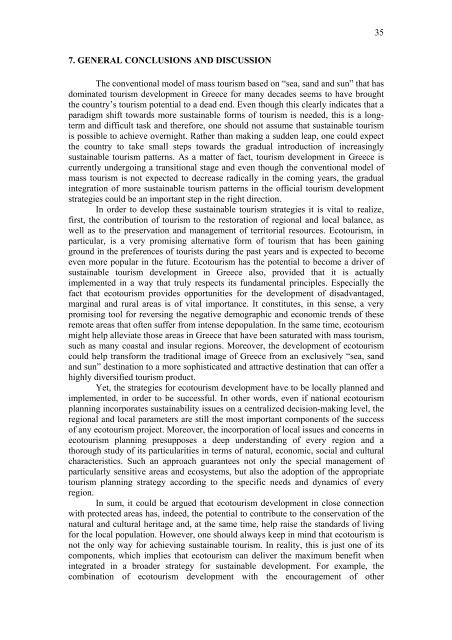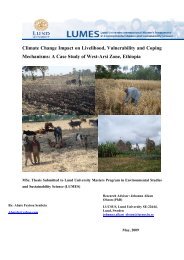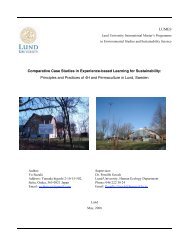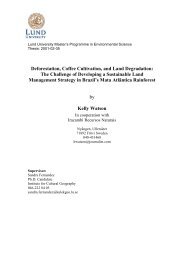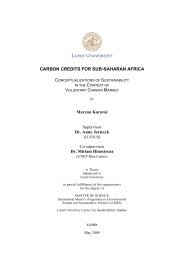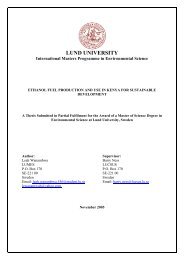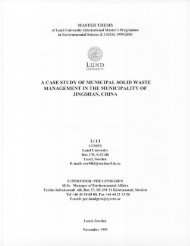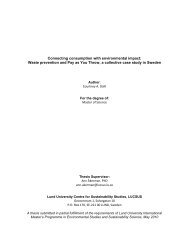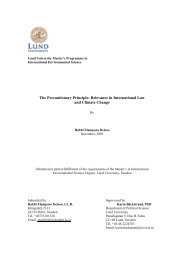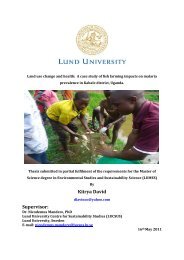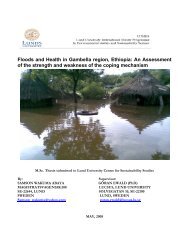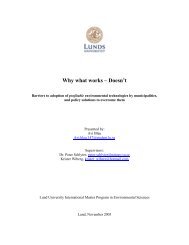Thesis title: âThe development of community-based ecotourism - lumes
Thesis title: âThe development of community-based ecotourism - lumes
Thesis title: âThe development of community-based ecotourism - lumes
You also want an ePaper? Increase the reach of your titles
YUMPU automatically turns print PDFs into web optimized ePapers that Google loves.
357. GENERAL CONCLUSIONS AND DISCUSSIONThe conventional model <strong>of</strong> mass tourism <strong>based</strong> on “sea, sand and sun” that hasdominated tourism <strong>development</strong> in Greece for many decades seems to have broughtthe country’s tourism potential to a dead end. Even though this clearly indicates that aparadigm shift towards more sustainable forms <strong>of</strong> tourism is needed, this is a longtermand difficult task and therefore, one should not assume that sustainable tourismis possible to achieve overnight. Rather than making a sudden leap, one could expectthe country to take small steps towards the gradual introduction <strong>of</strong> increasinglysustainable tourism patterns. As a matter <strong>of</strong> fact, tourism <strong>development</strong> in Greece iscurrently undergoing a transitional stage and even though the conventional model <strong>of</strong>mass tourism is not expected to decrease radically in the coming years, the gradualintegration <strong>of</strong> more sustainable tourism patterns in the <strong>of</strong>ficial tourism <strong>development</strong>strategies could be an important step in the right direction.In order to develop these sustainable tourism strategies it is vital to realize,first, the contribution <strong>of</strong> tourism to the restoration <strong>of</strong> regional and local balance, aswell as to the preservation and management <strong>of</strong> territorial resources. Ecotourism, inparticular, is a very promising alternative form <strong>of</strong> tourism that has been gainingground in the preferences <strong>of</strong> tourists during the past years and is expected to becomeeven more popular in the future. Ecotourism has the potential to become a driver <strong>of</strong>sustainable tourism <strong>development</strong> in Greece also, provided that it is actuallyimplemented in a way that truly respects its fundamental principles. Especially thefact that <strong>ecotourism</strong> provides opportunities for the <strong>development</strong> <strong>of</strong> disadvantaged,marginal and rural areas is <strong>of</strong> vital importance. It constitutes, in this sense, a verypromising tool for reversing the negative demographic and economic trends <strong>of</strong> theseremote areas that <strong>of</strong>ten suffer from intense depopulation. In the same time, <strong>ecotourism</strong>might help alleviate those areas in Greece that have been saturated with mass tourism,such as many coastal and insular regions. Moreover, the <strong>development</strong> <strong>of</strong> <strong>ecotourism</strong>could help transform the traditional image <strong>of</strong> Greece from an exclusively “sea, sandand sun” destination to a more sophisticated and attractive destination that can <strong>of</strong>fer ahighly diversified tourism product.Yet, the strategies for <strong>ecotourism</strong> <strong>development</strong> have to be locally planned andimplemented, in order to be successful. In other words, even if national <strong>ecotourism</strong>planning incorporates sustainability issues on a centralized decision-making level, theregional and local parameters are still the most important components <strong>of</strong> the success<strong>of</strong> any <strong>ecotourism</strong> project. Moreover, the incorporation <strong>of</strong> local issues and concerns in<strong>ecotourism</strong> planning presupposes a deep understanding <strong>of</strong> every region and athorough study <strong>of</strong> its particularities in terms <strong>of</strong> natural, economic, social and culturalcharacteristics. Such an approach guarantees not only the special management <strong>of</strong>particularly sensitive areas and ecosystems, but also the adoption <strong>of</strong> the appropriatetourism planning strategy according to the specific needs and dynamics <strong>of</strong> everyregion.In sum, it could be argued that <strong>ecotourism</strong> <strong>development</strong> in close connectionwith protected areas has, indeed, the potential to contribute to the conservation <strong>of</strong> thenatural and cultural heritage and, at the same time, help raise the standards <strong>of</strong> livingfor the local population. However, one should always keep in mind that <strong>ecotourism</strong> isnot the only way for achieving sustainable tourism. In reality, this is just one <strong>of</strong> itscomponents, which implies that <strong>ecotourism</strong> can deliver the maximum benefit whenintegrated in a broader strategy for sustainable <strong>development</strong>. For example, thecombination <strong>of</strong> <strong>ecotourism</strong> <strong>development</strong> with the encouragement <strong>of</strong> other


